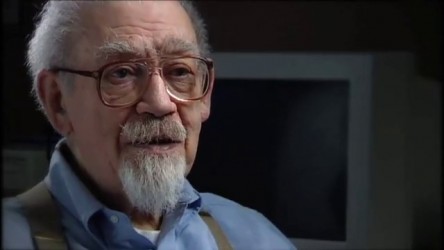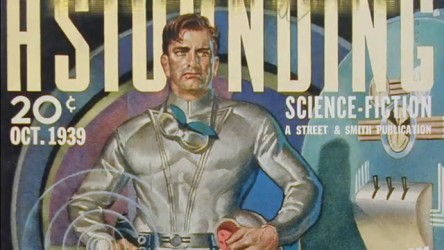Trolling has become a lost artform in this country. If you disagree with that statement, just turn on any cable news channel and watch it for 10 minutes. You will see so many examples of lame, self-refuting arguments, tautological pronouncements, faulty premises, absurd conclusions, and bargain basement concern trolling that it will make you sick. The problem isn’t that people troll in this country; it is that they don’t know (or care) how to troll well. They don’t know how to make you think. They have no interest in developing the critical thinking skills of other people, or in guiding humanity towards a more perfect state. They live only for their base goals of money and power.
Thus, it’s quite refreshing to watch a documentary about a man who understood that trolling is the true path to greatness. As editor of “Astounding”, John W. Campbell Jr. mercilessly trolled his writers in an effort to bring out the best in them. His constant questions, apparent non sequiturs, and endless counterarguments served to make his writers re-evaluate their ideas, their stories, and their connection to the society of their time. Obviously, Campbell was not the greatest troll of all time; that honor forever belongs to Socrates. Yet, in his own way, Campbell shaped a generation of science fiction writers and made a lasting impact on the artform.
The Golden Age of Science Fiction is a film that consists of little more than interview footage with a variety of science fiction writers, along a presentation of “Lunch with John W. Campbell Jr.” in the second quarter of its runtime. It remains fascinating throughout due to the undeniable mark the man had on every interview subject featured in this film. Even the authors who ended up hating (or at least disliking) the man have some positive things to say about him. He was respected by all of them, if nothing else.
The film does touch on some of Campbell’s less illustrious aspects, such as his interest in Dianetics, his antisemitism, and his fascist tendencies. One anecdote tells the tale of how Campbell allegedly pointed out that enslaved black people always had the option of giving up and dying if slavery was really that bad. At another point, it is explained that he did not hate individual Jewish people; he simply felt that it was unfortunate that they were born Jewish. Paradoxically, he later stated that he “always felt that the Jews were homo superior.” It’s either masterful trolling or the result of coming of age in pre-World War II America. In Campbell’s defense, though, he didn’t actually write “Battlefield Earth”.
Obviously, this is not a film that will interest many people. If you have no idea who any of the writers featured or mentioned in this film are, you may not find it all that fascinating. I was only familiar with about half of them, myself. However, if you have any interest in science fiction, or in writing in general, this movie provides a unique look into the minds of a generation of writers, and presents their methods, their madness, and their worldview in their own words. It’s not that long, either; at half the length of your average Transformers film, the science fiction content to minute ratio dwarfs Revenge of the Fallen‘s by many orders of magnitude.
The writers of Transformers would do well to watch this documentary. They won’t, because thinking sucks, but in doing so they will miss a very important point made about storytelling. Campbell’s big idea was rather simple: writers should spend less time explaining how all of their proposed scientific advances work and spend more time developing and analyzing their characters and their relationships. Science should be presented realistically, scientists and engineers should act like their real world counterparts, and the actual details of how everything works are not all that important. In other words, science fiction should be great (or at least good) fiction first, and applied math and physics second. It sounds obvious when one thinks about it, and the idea was around before Campbell (H.G. Wells was certainly writing classic fiction), but Campbell represented a watershed moment in science fiction publishing. Finally, somebody stood up and said: just write an actual story!
It’s great to hear the laments of some of the writers regarding the state of science fiction writing today (or whenever these interviews were filmed). It really has devolved into “corporate category fiction… in the pejorative sense” along with everything else. And while this has been a pretty good year for science fiction in film overall, we’ve still had to deal with After Earth (which I didn’t watch, but holy shit, the preview was enough.) Many of the cinematic sci-fi disasters of the past decade or two have somehow managed to ignore both the human relationship component of classic writing along with the explanations of the advanced science. They’ve fallen down to a base level of ridiculous special effects, overt contradictions to contemporary scientific theories, and Will Smith. It’s as sure a sign of a civilization in decline as any other. Do we really care so little about our world?
Yes, Will, I’m still upset about I, Robot. And even though Asimov has passed away, he appeared in archive footage in this film, and he didn’t look too happy about it either.
I don’t want to sound too negative, though. The last few years have given us everything from Source Code to District 9, and Peter Berg’s threatened adaptation of “Dune” appears to be dead in the water. The heavens shine down upon us, yet still I fear. What if they do it? What if they actually remake Logan’s Run? Why can we not look towards the future? Why are we always trapped in nostalgic admiration for a nonexistent past? The best science fiction has always kept its focus on its own time. Science fiction tells us things about the human condition, our own lives, and where we are going both as individuals and as humanity. The declining interest in “real” science fiction mirrors the decline in our interest in math, science, and philosophy as a society.
It is stated late in this documentary that the world of the 1960’s was essentially the world of science fiction from the 1940’s. Campbell was a major part of that movement, and it is observed that much of his eccentric (and at times embarrassing) behavior in his later years may have been due to a desire to recapture that apparent power of effecting social change. His interest in ESP and his desire for its scientific study was not all that different from the interests that drove him to success in the 1940’s. It’s just that, like with all trolls, at some point the message has been delivered and it’s time to move on. In the absence of hemlock, Campbell continued to ride the waves of his fancies in seemingly random directions until his eventual death. There are certainly worse fates to be had. Really, though, this is the man who wrote “Who Goes There?” (adapted into John Carpenter’s The Thing), so he’s beyond reproach. Well, at least for the ESP thing.
Now that I’ve typed out a mess of words that would send every writer presented in this film into convulsions due to its grammatical incoherence, I bid you adieu. Good night, America. Here’s to our future.


